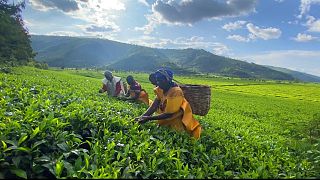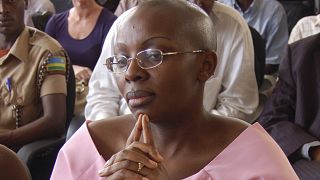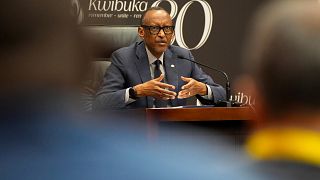Rwanda
Access to affordable, clean and safe water is an ongoing challenge among the poor communities in Rwanda. However, one company is helping to break the gap by purifying groundwater and then selling it to the locals at an affordable price.
The Nyabugogo River is an important water source for the local population. The river that winds its way around the land near the capital Kigali, can only be used by families for washing and cleaning. But when they need drinking water, impoverished communities look for groundwater sources which are not always easy to get to - or safe to use.
People queue to collect canisters of water, and therefore putting themselves at risk of contracting waterborne diseases. The alternative is to have water treated by commercial companies - but the cost is too high for the poor in society.
Remy Duhuze, of Rwanda Water Resources Board, says access to enough water is a challenge for the country. "We need water in so many daily activities, we need water for drinking, we need water for household activities, we need water for irrigation, we need water for hydropower generation, we need water for so many activities. But the water that is used by our population is less if we compare with other countries," he said.
Companies like Iriba are trying to make clean and safe water accessible for everyone. Iriba has a plant in Kigali for purifying groundwater and workers test the liquid to make sure it is safe for consumption before it is made available to the locals.
The business was set up by Yvette Ishimwe, who is the Managing Director of Iriba Water Group. "The purpose of this project is to give people access to clean water, especially those who don't have access to it. We target basically low income people, like our ATMs in public places, in markets, in car parking stations, we are targeting low income people who can't afford bottled water," she explains.
To serve the underserved
Kimironko market is a typical area where low income communities work and shop and it is here that Iriba has set up one of its water kiosks. The company targets high traffic areas like markets and public car parks where thirsty workers can stop off for a short break, and buy a glass of water that they know is safe to drink - and affordable.
"I have a hard job that requires me to drink water regularly, I can't afford to buy a 1,000-franc bottle with what I earn, whereas here I pay 100 francs. These kiosks help us a lot when we are thirsty, we come here and we quench our thirst," says local resident, Jean de Dieu.
This kiosk normally serves 40 to 50 customers an hour showing that there is clear demand for cheap, safe water. "Mineral water is for the rich class, not for us. With the water I need it is something I don't think about. I'm content with this water, it's made a big difference to my health," says de Dieu.
Ishimwe says she wants to "serve the underserved" but she doesn't stop there.
It's not just low income neighbourhoods that need access to cheap, clean water. Some schools have Iriba's water dispensers installed in them with a simple card mode of payment.They pay a subscription fee to get unlimited access to water during the school term, with no upfront costs to the school. "I had problems with illnesses in my stomach, but now I feel good when I drink this water. And when it is hot, we drink cold water, I am happy," says pupil Paula Ineza.
Ishimwe says her company has tailored the dispenser to the needs of schools. "Many schools don't have clean water facilities. Students are just drinking water from the tap which is not safe for drinking. They have issues with diarrhoea and typhoid and different other diseases that come from drinking contaminated water," she says.
She calls the project 'Tap and Drink for Schools' and says subscriptions can be as little as 1,500 francs ($1.50) a term. Perhaps it is initiatives like Iriba that will bring clean water to the whole population of Rwanda, making groundwater safe.
"As the country that (is) always aiming at sustainability and ensuring universal access to clean water, we think these projects, these companies have to be encouraged, they have to be supported, they have to be facilitated, so that these groundwater resources, that are very beneficial, that is very important for the country, can serve in the different sectors of development of the country," says Duhuze.
Iriba Water plans to extend its supply to other areas, including rural parts of the country. Less than 50 percent of Rwanda's population has access to clean drinking water within 30 minutes of their homes, according to UNICEF.











01:52
In Goma, solar power brings light and hope in Ndosho neighbourhood
02:13
Congo and Rwanda sign a US-mediated peace deal aimed at ending decades of bloody conflict
00:54
African Human Rights court says it can hear case brought by DRC against Rwanda
01:20
Somalia launches Centennial Vision 2060 roadmap for 'peace, prospertity and progress'
11:14
Rwanda Walks Away: what’s behind the Central Africa rift? [Business Africa]
Go to video
Man City closing in on swoop for Wolves’ Rayan Aït-Nouri